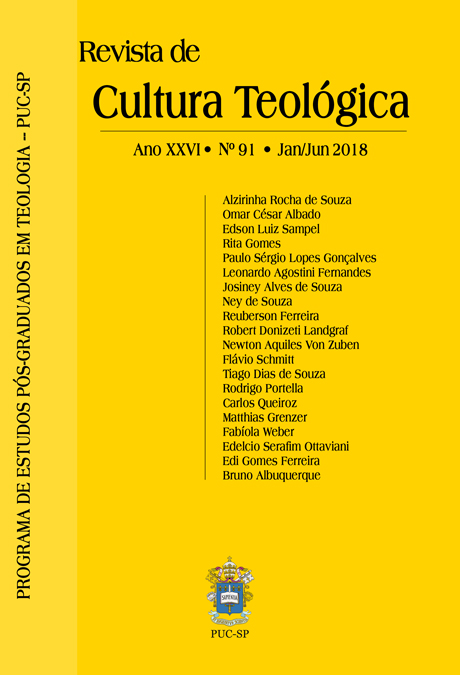Christian communities: echo of Jesus’s voice
DOI:
https://doi.org/10.23925/rct.i91.37161Keywords:
Called, Saul, Christian Communities, Christian values, LGBT communityAbstract
This article is an exercise of reflection in Practical Theology, from the interpellations of the Apostolic Exhortation Gaudete et Exsultate (GE) of Pope Francis on the call to holiness, and from the research work about the call of Paul on the way to Damascus and his experience with the early Christian communities. It establishes a relationship with current reports of homosexuals or transsexuals who wish to live the gospel values, but who feel persecuted in their condition. The purpose of this article is to stimulate a reflection on the Pauline experience which, in pursuing Christian communities in the name of an ideal of religious life, hears the voice of Jesus who says: "Saul, Saul why do you persecute me?" (Acts 9, 4). It applies epoché, proper to the phenomenological method, to let come to light and to our ears the often muted cry of people who seek to live the Christian values and a way of sanctity without denying their own condition. These are reverberated in the voice of Jesus and cry, "Why do you persecute us?" Strategically suspending the tables of pre-established values, this work wishes to show the theological-pastoral reasons that presuppose, in applying the "mercy principle" (cf. GE, 46), listening to these voices.References
REFERÊNCIAS BIBLIOGRÁFICAS
AGAMBEN, Giorgio. Altíssima pobreza: regras monásticas e formas de vida. Trad. Selvino J. Assmann. São Paulo: Boitempo, 2014.
_________________. O tempo que resta: um comentário à Carta aos Romanos. Tradução Davi Pessoa e Cláudio Oliveira. Belo Horizonte, São Paulo, Rio de Janeiro: Autêntica, 2016.
ARISTÓTELES. Metafísica, 1019b, 9-10. V. II. Texto grego com tradução ao lado. Tradução de Marcelo Perine. São Paulo: Loyola, 2002.
EVERTS, J.M. Conversão e Vocação de Paulo. In: Dicionário de Paulo e Suas Cartas. São Paulo: Edições Loyola, 2008, p. 260-270.
HUSSERL, Edmund. A crise da humanidade européia e a filosofia. EDIPUCRS: Porto Alegre – RS, 2002.
PAPA FRANCISCO. Exortação Apostólica Gaudete et Exsultate. Dsponível em: < http://w2.vatican.va/content/francesco/pt/apost_exhortations/documents/papa-francesco_esortazione-ap_20180319_gaudete-et-exsultate.html> Acesso em 12.04.2018.
RAMOS, José Augusto, Paulo de Tarso: a conversão como acto hermenêutico. In: Humanitas Suplementun. Paulo de Tarso: grego e romano, judeu e cristão. Lisboa: Centro de Estudos Clássicos da Universidade de Lisboa, 1ª/ 2012.
ROUTHIER, Gilles; VIAU, Marcel. Précis de Théologie Practique. Deuxième Édition augmentée. Lumen Vitae: Bruxelles; Novalis: Montréal; L'Atelier: Ivry-sur-Sene, 2007.
SARAMAGO, José. Ensaio sobre a Cegueira. 21ª ed. Porto: Porto Editora, 2014. Formato e-book.
ARTIGOS, REVISTAS E PERIÓDICOS
MIRANDA, França. Evangelizar ou Humanizar? Revista Eclesiástica Brasileira, ano 74, n. 295, jul./set de 2014, p. 519
SELVATICI, Mônica. O Martírio de Estêvão e a comunidade cristã de Jerusalém: a questão da memória no relato historiográfico de Atos dos Apóstolos. Orácula, São Bernardo do Campo, v 2, n, 3, 2006.





